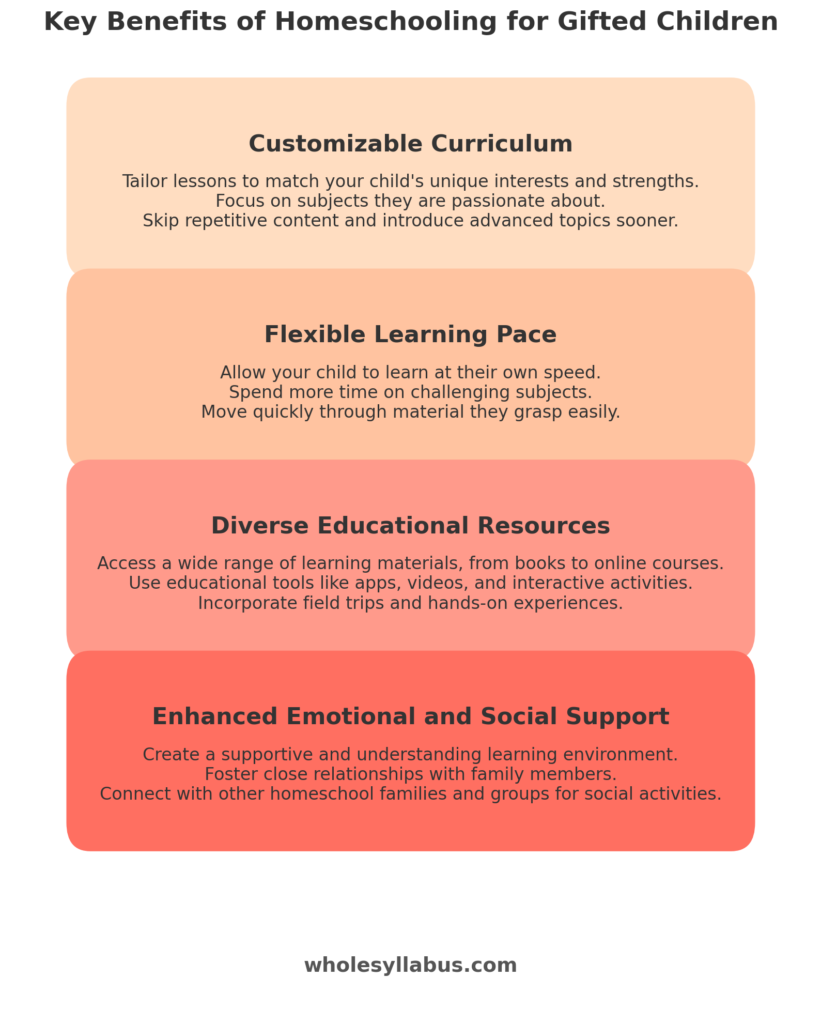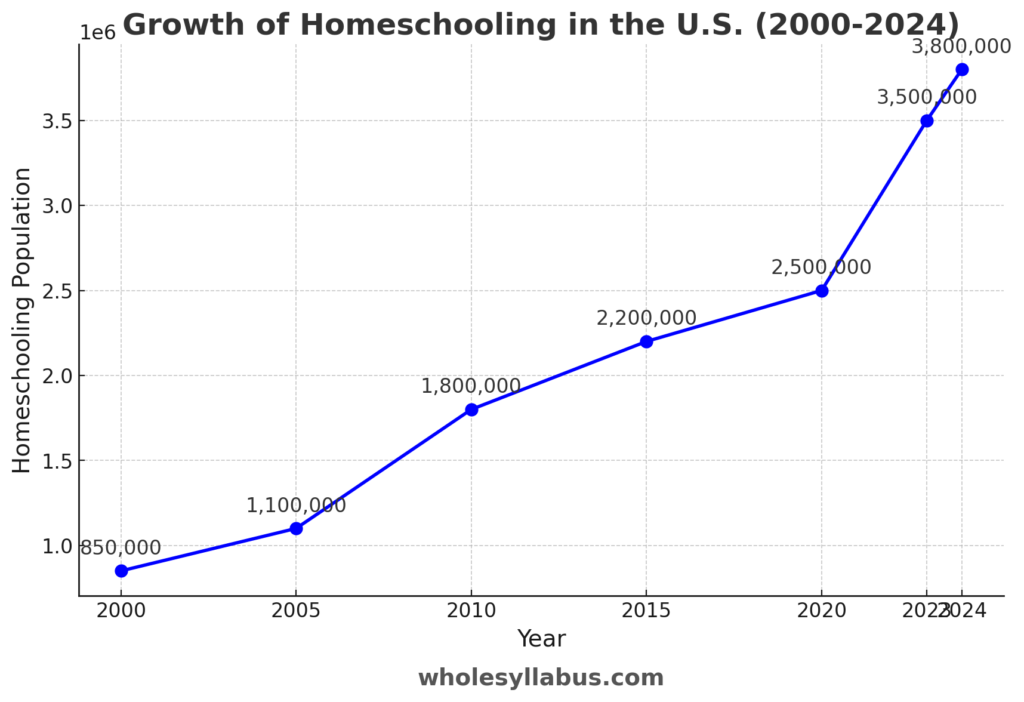The best education for a gifted child depends on their individual needs and circumstances. Parents should consider programs that offer challenging coursework, individualized attention, and opportunities for social interaction. Balancing academic and emotional development is key to fostering a gifted child’s full potential.
What Education is Best for a Gifted Child?
According to recent trends, here are the key educational options for gifted children:
1. Gifted and Talented Programs
- Specialized Curriculum: These programs offer advanced coursework and learning opportunities.
- Tailored Instruction: Teachers trained in gifted education can provide individualized learning plans.
Homeschooling for a Gifted Child
- Customization: Parents can tailor the curriculum to match the child’s interests and pace.
- Flexible Schedule: Allows children to delve deeply into subjects they are passionate about.
One of the best options for a gifted child is homeschooling. It is personalized and flexible, often found in homeschooling environments. Recent trends indicate that homeschooling provides the adaptability needed to cater to a gifted child’s unique learning pace and interests.
Key Benefits of Homeschooling for Gifted Children
- Personalized Learning: Homeschooling allows for customized curriculums tailored to a child’s strengths and areas of interest.
- Flexible Pacing: Gifted children can advance at their own speed, avoiding boredom and remaining engaged.
- Diverse Learning Opportunities: Access to specialized programs, online courses, and extracurricular activities not typically available in traditional school settings.
- Strong Support Systems: Closer monitoring and support from parents or guardians.

Statistics:
- A study by the Davidson Institute for Talent Development shows that 87% of homeschooled gifted students reported higher satisfaction with their education compared to their peers in traditional schools.
Growth of Homeschooling

National Home Education Research Institute (NHERI) reports that over 2.5 million students in the U.S. are homeschooled, and the number is growing by 2-8% each year.
3. Private Schools
- Smaller Class Sizes: More individualized attention.
- Advanced Resources: Access to specialized teachers and advanced learning materials.
4. Charter Schools
Charter schools are independently operated public schools that have more flexibility in their operations compared to traditional public schools. Here are some key points about charter schools:
- Innovative Approaches: Charter schools often employ unique and innovative teaching methods to meet diverse student needs. This flexibility allows them to create specialized programs, including those tailored for gifted students.
- Performance-Based Accountability: These schools are accountable to their authorizers (e.g., state or local education boards) for academic results and organizational performance. They must meet certain standards to continue operating.
- Diverse Curriculum: Charter schools can design curricula that differ from district public schools. This can include project-based learning, STEM (Science, Technology, Engineering, Mathematics) focuses, and arts integration.
- Parental Choice: Families choose to enroll their children in charter schools, often seeking alternatives to traditional public schools that may better suit their children’s learning styles and needs.
- Publicly Funded: Like traditional public schools, charter schools are funded by taxpayer dollars. However, they have more freedom in how they use those funds to innovate and improve education.
- Growing Popularity: According to the National Alliance for Public Charter Schools, over 3 million students in the U.S. are enrolled in charter schools, representing a significant increase over the past decade.
Useful Link
- National Alliance for Public Charter Schools: publiccharters.org
5. Online Learning
- Variety of Courses: Access to advanced courses not available in local schools.
- Self-Paced Learning: Allows students to progress at their own speed.
Recent Statistics
- Gifted Programs: In the U.S., about 6-10% of students are enrolled in gifted and talented programs.
- Homeschooling Growth: Homeschooling among gifted students has increased by 5-7% annually over the past decade.
- Private Schools: Approximately 10% of U.S. students attend private schools, with a significant portion being gifted.
Best Careers for Gifted Children
The best career for a gifted child is one that aligns with their interests, strengths, and values. Encouraging exploration in various fields and providing opportunities for advanced learning can help gifted children discover their ideal career path.
Recent trends highlight several promising career paths for gifted individuals:
1. STEM Fields (Science, Technology, Engineering, and Mathematics)
- High Demand: Careers in STEM are growing rapidly, offering numerous opportunities.
- Innovation and Research: Gifted individuals often thrive in environments that require problem-solving and innovative thinking.
2. Medicine and Healthcare
- Impactful Work: Careers in healthcare allow gifted individuals to make significant contributions to society.
- Specialized Fields: Opportunities in research, surgery, and medical innovation can be particularly fulfilling.
3. Creative Arts
- Expression and Innovation: Fields like writing, music, visual arts, and performing arts provide outlets for creativity.
- Recognition: Gifted individuals often achieve high levels of success and recognition in creative fields.
4. Law and Advocacy
- Critical Thinking: Gifted individuals excel in careers that require strong analytical and reasoning skills.
- Social Impact: Opportunities to influence policy and advocate for justice can be rewarding.
5. Entrepreneurship
- Autonomy: Gifted individuals often thrive when they can create and manage their own ventures.
- Innovation: Entrepreneurship allows for the development of new ideas and solutions to complex problems.
6. Academic and Research Careers
- Lifelong Learning: These careers provide opportunities for continuous learning and intellectual growth.
- Influence: Gifted individuals can contribute significantly to their fields through teaching and research.
Statistics and Trends
- STEM Jobs: According to the U.S. Bureau of Labor Statistics, STEM jobs are projected to grow by 8% from 2019 to 2029.
- Healthcare Growth: The healthcare sector is expected to add more jobs than any other occupational group, with a projected growth rate of 15% from 2019 to 2029.
- Creative Industries: The creative economy is growing, with the global market for creative goods reaching $509 billion in 2018.

Nawab is an experienced educator with a decade of teaching across preschool to K-12 levels. Holding both a graduate degree and a diploma in elementary education, he is passionate about fostering learning environments that inspire young minds. In addition to his teaching career, Nawab has been actively blogging and writing content for the past four years, sharing insights and resources for educators and parents alike.
